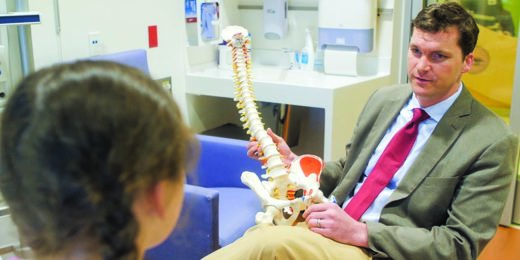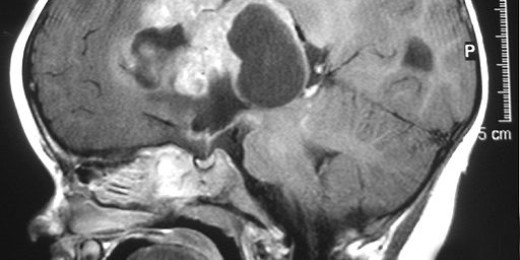Stanford researchers have several projects underway to improve imaging techniques, bracing treatment and surgeries for kids and teens with scoliosis.
Author: Erin Digitale
Nation’s pediatricians push for safe, effective COVID-19 vaccines
Stanford infectious disease expert Yvonne Maldonado, MD, describes principles for developing safe and effective COVID-19 vaccines for everyone.
Easier-to-use technology helps young people with type 1 diabetes
Technology that sends blood sugar-level updates to their smartphones improves outcomes for young people with type 1 diabetes, a Stanford trial shows.
Stanford team improves diagnostics for newborns’ brain bleeds
With changes in ultrasound technology, Stanford researchers have improved the method of diagnosing brain bleeds, a common form of birth injury in newborns.
Animated video helps kids weather the COVID-19 pandemic
A Stanford Medicine educator worked on an animated video that helps children manage feelings of loneliness during the global COVID-19 pandemic.
Seeking a less-burdensome treatment for Diamond Blackfan anemia
Stanford researchers have found a good drug target for treating Diamond-Blackfan anemia, a genetic disease that impairs red blood cell formation.
Dust pollution linked to infant mortality in Sub-Saharan Africa
Dust pollution in the air contributes to infant mortality in Sub-Saharan Africa, a Stanford-led study found. Watering the desert may lessen the harm.
Understanding the biological clock of pregnancy
Stanford scientists have built a detailed picture of the biological clock of pregnancy, tracking thousands of metabolic markers throughout gestation.
Proximity to oil and gas wells linked to prematurity risk
Living near an oil and gas well in California's San Joaquin Valley during pregnancy is linked to increased risk of spontaneous preterm birth, finds Stanford study.
The future of diabetes: Improving islet transplantation
A Stanford team is developing a bioscaffold that helps insulin-producing cells get enough oxygen when transplanted for diabetes treatment.
Inspired by her sister’s resilience, psychiatrist aspires to instill hope in others
Stanford pediatric psychiatrist Manpreet Singh draws inspiration from her sister, as she strives to instill hope in people who feel hopeless.
Navigating cancer as a young adult: ‘I’m trying to figure out who I am’
Teens and young adults with cancer face biological and psychosocial challenges distinct from those of other cancer patients.
New advances toward safely targeting immune cells to pediatric brain tumors
Stanford scientists have taken important steps toward figuring out how to use immune therapy for a group of severe pediatric brain tumors.
Gender discrimination is linked to depression in child-bearing women, Stanford-led study finds
A Stanford-led study has found that experiencing gender discrimination was associated with depressive symptoms in women who had young children.
Teens vulnerable to social-media promotion of vaping
Social media posts promoting e-cigarettes appear able to make teens more willing to vape, new Stanford research has shown.
To prevent premature birth, computers ID drug that may help
A widely used antacid may help prevent premature births, new Stanford-UCSF research that used computing to match existing drugs with diseases suggests.

















